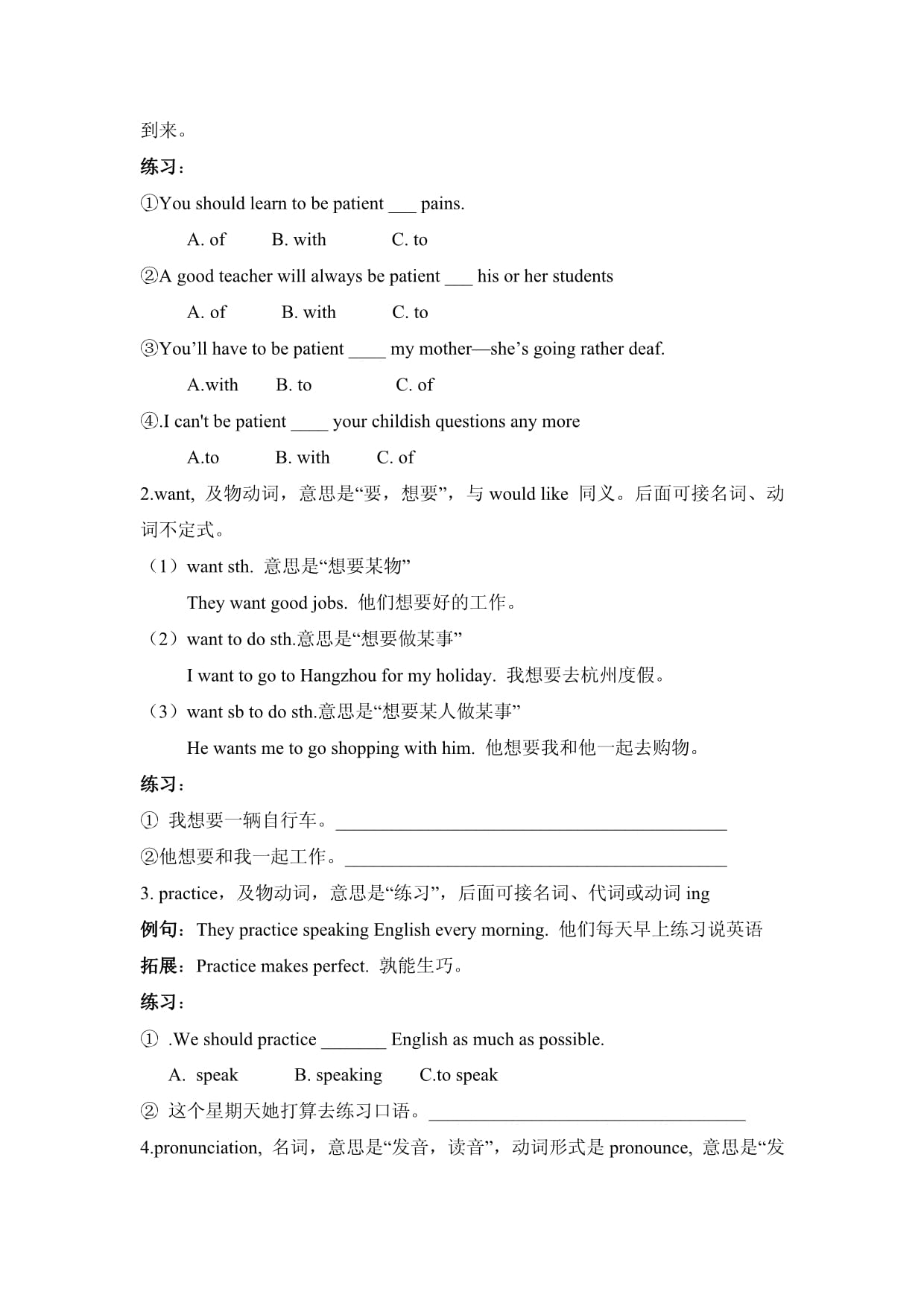




版权说明:本文档由用户提供并上传,收益归属内容提供方,若内容存在侵权,请进行举报或认领
文档简介
UnitUnit1Howcanwebeegoodlearners?知识重难点知识重难点1.by+动词ing的用法2.能听懂谈论学习方法的对话,学会谈论平时的学习方法3.能写出简单介绍学习方法或针对学习中的困难,给他人提出合理建议的短文4.经典句型:(1)Howdoyoustudyforatest?你如何备考?Istudybyworkingwithagroup.我通过参加小组学习。(2)Idiscoveredthatlisteningtosomethinginterestingisthesecrettolanguagelearning.我发现听有趣的事情是语言学习的秘诀。重点短语:workwithfriends和朋友一起学习makewordcards制作单词卡片listentotapes听磁带asktheteacherforhelp向老师求助studyforatest备考watchvideos看录像haveconversationswith与......交谈/会话readaloud大声读speakingskills口语技巧spokenEnglish英语口语alittle有点儿giveareport作报告atfirst起初,起先wordbyword一字一字地;逐字thesecretto......的秘诀16.so...that...如此......以至于......17.becauseof因为18.fallinlovewith爱上......19.aswell也20.somethinginteresting有趣的事情21.insteadof代替;而不是22.sothat以便;为了23.takenotes做笔记24.themeaningof.........的意思25.howoften多久一次26.makemistakes犯错误27.alotof许多28.talkto交谈;谈话29.bebornwith天生具有30.theabilitytodosth.做某事的能力31.dependon依靠32.learninghabits学习习惯33.inmon共有的34.beinterestedin对......感兴趣35.payattentionto注意36.worryabout担心37.forexample例如38.getbored感到无聊39.thinkabout考虑40.begoodat在......方面擅长41.evenif即使42.beafraidof害怕43.lookfor寻找44.eachother互相45.findout查明46.lookup查阅47.connect...with...把......和......连接或联系起来用法集萃:bydoingsth.通过做某事Whataboutdoingsth.做某事怎么样?finishdoingsth.完成某事trytodosth.尽力做某事findit+adj.+todosth.发现做某事...beafraidtodosth.不敢做某事beafraidofdoingsth.害怕做某事begintodosth.开始做某事helpsb(to)dosth.帮助某人做某事wanttodosth.想要做某事practicedoingsth.练习做某事needtodosth.需要做某事keepdoingsth.一直做某事It+be+adj.+todosth.做某事是......的remembertodosth.记得做某事the+比较级,the+比较级越......,就越......SectionA1.patient,形容词,意思是“有耐心的”,常用短语:bepatientwithsb意思是“对某人有耐心”;bepatientofsth意思是“忍耐某事”例句:(1)Ourteacherisverypatentwithus.老师对我们很有耐心。(2)Youshouldlearntobepatientofsomethingunfair.你应该学会忍耐不公平的事。拓展:patient可以用作可数名词,意思是“病人”,复数是patients例句:(1)Thepatientistooweaktospeak.这个病人太虚弱了,不能说话。(2)Mostofmypatientsweletheingofsummer.我的大部分病人盼望着夏天的到来。练习:①Youshouldlearntobepatient___pains.A.ofB.withC.to②Agoodteacherwillalwaysbepatient___hisorherstudentsofB.withC.to③You’llhavetobepatient____mymother—she’sgoingratherdeaf.withB.toC.of④.Ican'tbepatient____yourchildishquestionsanymoreA.toB.withC.of
2.want,及物动词,意思是“要,想要”,与wouldlike同义。后面可接名词、动词不定式。wantsth.意思是“想要某物”Theywantgoodjobs.他们想要好的工作。wanttodosth.意思是“想要做某事”IwanttogotoHangzhouformyholiday.我想要去杭州度假。wantsbtodosth.意思是“想要某人做某事”Hewantsmetogoshoppingwithhim.他想要我和他一起去购物。练习:我想要一辆自行车。__________________________________________②他想要和我一起工作。_________________________________________practice,及物动词,意思是“练习”,后面可接名词、代词或动词ing例句:TheypracticespeakingEnglisheverymorning.他们每天早上练习说英语拓展:Practicemakesperfect.孰能生巧。练习:.Weshouldpractice_______Englishasmuchaspossible.speakB.speakingC.tospeak这个星期天她打算去练习口语。__________________________________pronunciation,名词,意思是“发音,读音”,动词形式是pronounce,意思是“发音”例句:HespeaksEnglishfluently,buthispronunciationispoor.他英语讲得很流利,但他的发音不好。Pleasepronounceyourwordsclearly.请你把单词得音发清楚。练习:①Canyou_____________(pronounce)thisword?②.His______________(pronounce)isnotgood.sound,连系动词,意思是“听起来”,后面接形容词做表语。例句:Yourideasoundsgood.你的主意听起来不错。拓展:英语中常用的连系动词一是(be),一感(feel),一保持(keep)四个起来(sound、look、smell、taste)好像(seem)变了(get、turn、bee)三拓展:bee是一个中性词,用于意义好、坏两方面的变化都可以,强调变化的过程已经完成,后面可接名词或形容词。例句:(1)ShebeesanEnglishteacher.她成为了一名英语老师。(2)Hebecameangrywhenheheardthenews.当他听到这个消息时,他很生气。turn多用于指在颜色和性质等方面与以前的完全不同、看得见的或人人注目的状态上的变化,强调变化的结果。turn后面多接表示颜色的形容词作表语,也可以接天气的形容词作表语。意思上侧重于“变得与以前完全不同”例句:(1)Herfaceturnedred.她的脸红了。(2)Theweathersuddenlyturnedcold.天气突然变冷了。get表示一种变化过程,常与形容词的比较级连用。强调的是“渐渐变得”,后常接形容词的比较级形式。例句:Inwinterthedaysgetshorter.冬天白天渐渐变短了。(2)It’sgettingdarkeranddarkeroutside.外面越来越黑了。练习:1.DoyouknowthesongGangnamStyle?Ofcourse.It_____interesting.A.tastesB.smellsC.sounds2.Thedish_____verydelicious!A.smellsB.tastesC.feels3.I
____
tired
last
night.A.feltB.tastedC.sounds4.
My
English
teacher
____young.A.looksB.smellsC.feels5.My
younger
brother____a
student
last
year.A.tastesB.smellsC.became6.Theman_____successfulatlast.A.gotB.tastedC.looked7.Theleaves_____yellow.A.lookedB.turnedC.felt8.Thedoor_____openA.looksB.feelsC.keeps9.Don’teatthefood.It____bad.A.smellsB.feelsC.sounds10.you____right.A.smellsB.seemC.looks6.finish,及物动词,意思是“完成”,后面可接名词、代词或动词ing例句:(1)Ifinishedmyhomeworkhalfanhourago.我半个小时前做完了家庭作业。(2)Haveyoufinishedcooking?你做完饭了吗?拓展:常跟动词ing的动词和短语完成、练习、盼望、忙(finish、practice、lookforwardto、bebusy)考虑、建议、不禁、想(consider、suggest、can’thelp、feellike)错过、习惯、放弃(miss、beusedto、giveup)继续、喜欢、介意(keepon、enjoy、mind)练习:Mrs.Zhaowent______aftershefinished_____herworklastMonday.shop;doingB.shopping;doingC.shopping;tododiscover,“发现”,指发现或偶尔发现原本存在的,但一直未被人们认识或不为人知的东西;invent,“发明”,指创造发明出新的、原来不存在的东西。例句:(1)Recentlytheydiscoveredgoldinthatarea.最近他们在那个地区发现了黄金。(2)Edisoninventedtheelectriclightbulb.爱迪生发明了电灯泡。练习:They__________theislandinthisarea.(discovered;invented)Someone_________gunpowder(火药)(discovered;invented)(seismograph地震仪;papermaking造纸术;printing印刷术;pass指南针)memorize,及物动词,意思是“记住;记忆”,相当于remember。名词形式memory“记忆,记忆力”例句:(1)Shememorizedthenumberofthecar.她记住了那辆小汽车的车牌号。练习:Good________bymakingapictureinyourmind.memorizeB.memoryC.tomemorize.Ican’t_______thesewords.memorizeB.memoryC.tomemorizeexpression,可数名词,意思是“表情、表示”例句:(1)Therewasnoexpressiononherface.她脸上毫无表情。(2)Isentthemflowersasanexpressionofthanks.我给他们送去了鲜花表示感谢。练习:他有丰富的表情。___________________________________________although连词,引导让步状语从句,意思是“尽管、虽然”,与though同义。例句:(1)Althoughitrained,theboysstillplayedoutside.尽管天下雨了,但是那些男孩们仍在外面玩耍。(2)Theyarehappyalthoughtheyarepoor.尽管他们穷,但他们很幸福。注意:虽然汉语中我们可以说虽然......,但是......,但英语中although/though不能与but同时出现在一个句子中。拓展:一、用作连词表示“虽然”,两者大致同义,可换用,只是
although
比
though
更为正式:Though[Although]itwasraining,wewentthere.
虽然下着雨,但我们还是去了那儿。二、用作副词although
一般不用作副词,而
though
可用作副词,且一般放在句末(不放在句首),意为“可是”、“不过”:Helookshealthy,though.
但他看起来很健康。the+比较级,the+比较级,意思“越......,就越......”。例句:Themoreyouread,thefasteryou’llbe.你读书越多,你读书的速度就会越快。Themoreyoulearn,themoreyouknow.你学得越多,懂得就越多。练习:Themoreyousmile,the______youwillfeel.happyB.happierC.happily②The_____youwork,the_____moneyyouwillearn.A.hard;moreB.hard;moreC.more;more12.by的用法(1)by+动词ing,意思“用......方法/手段”。HowdoyoulearnEnglish?你是怎样学习英语的?Ilearnbystudywithagroup.我通过参加小组学习。by+交通工具(by后不加冠词),意思“乘/坐......”。Igotoschoolbybus.by+地点,意思“在......旁边”。Welivebythesea.我们住在海边。by+时间,意思“不迟于......,在......之前”。Imustbeinbedbyteno’clock.我必须在10点之前睡觉。by,用于被动语态,意思“由,被”。Thekiteismadebyme.这只风筝是我做的。练习:①Iwanttosit____myfriend,Susan.A.byB.down
C.on
②Therearesometrees____theriver.A.inB.onC.by③HowaboutgoingtoBeijing_____plane?A.inB.byC.on④Hestudiesforatestby_____withhisclassmates.A.toworkB.workingC.havework⑤Thegirlmakesagreatprogressandsheispraised______herheadteacher.A.inB.onC.by⑥______fiveo’clockpm,Ihavefinishedmyhomework.A.InB.ByC.On课堂课堂练习Iwastired.IhadbeenstudyingEnglishfor8years,butmyspokenEnglishwas_______15______terrible.IwenttoEnglishschooleverynight.I______16______differenttextbooksandlearnedthegrammarrules____17___themeveryday.Butduringtheeightyears,Ihadn’tgotany.____18___atall!Beingtiredofschool,Isearched(搜索)theInternetfor“LearnEnglish”onenight.ThenIfounda______19______Englishlearningsystem.SevendayslaterIstartedusingthesystemtolearnEnglish.Mylife______20______fromthenon.Iusedthesystemeveryday.Iwas______21______tofindthatlearningEnglishinthiswaywassoeasyandinteresting.Noboringgrammarrules.Thearticleswereinterestingandthestorieswerefunny.Thensomethingamazinghappened.OnedayI______22______anAmericanmannamedJamesinacoffeeshop.Withoutthinking,Istartedto______23______him.MyEnglishwordscameoutautomatically(无意识地).Itwashardformetobelieveit.IcouldspeakEnglishsoeasily.Ididn’tfeelany______24______orworry.Jamesunderstoodmyideasandfeelings.Wetalkedfortwohourswithout______25______.ThenweexchangedemailsandSkypeIDs.WedecidedtotalktoeachotherontheInterneteveryweek.MyEnglishhas______26______greatlynow.IthinktherearemanywaysoflearningEnglishforustouse.Youshouldstopusingawaythatdoesn’tworkandfindoutwhatishelpfultoyou.()15.A.althoughB.stillC.butD.or()16.A.metB.sawC.readD.looked()17.A.byB.inC.forD.about()18.A.messageB.mistakeC.progressD.challenge()19.A.boringB.monC.disappointingD.perfect()20.A.changedB.startedC.solvedD.impressed()21.A.afraidB.angryC.crazyD.surprised()22.A.metB.beatC.helpedD.forgot()23.A.waitforB.talkwithC.laughatD.thinkof()24.A.interestB.hobbyC.stressD.idea()25.A.sayingB.predictingC.stoppingD.understanding()26.A.missedB.destroyedC.influencedD.improvedA
Clever
BirdA
man
has
a
bird.
It
is
very
clever.
Every
day
the
man
speaks
to
the
bird.“Hello!”he
says.
“Hello!”the
bird
answers.“What
are
you
doing?”says
the
man.“What
are
you
doing?”says
the
bird.The
man
is
not
at
home
one
day.
A
thief
es
in.
He
is
taking
many
things.“Hello!”The
thief
hears
the
bird's
words.“What
are
you
doing?”The
thief
is
very
afraid,so
he
does
not
take
any
things
and
runs
out
of
the
house.
The
man
teaches
the
bird
________.A.how
to
say
something
B.
how
to
sing
songs
C.
how
to
eat
something
D.
how
to
dance
2.
The
bird
is
________.A.
very
nice
B.
very
cleverC.
very
beautiful
D.
very
silly(傻的)
3.
The
man
speaks
to
the
bird
________.
A.sometimes
B.
once
a
week
C.
every
week
D.
every
day
The
thief
is
taking
________
things
from
the
house.
A.
a
few
B.
a
little
C.
a
lot
of
D.
some
5.
The
thief
________
out
of
the
room.A.
walks
B.
es
C.
runs
D.
goesMr.Smith’s
our
Chinese
teacher.
He
always
asks
the
same
student
to
answer
his
questions
because
he
doesn't
look
at
the
students
at
all.
Yesterday
he
questioned
Dick
three
times.
Dick
was
very
angry.
After
class
Dick
asked
me,
"What
shall
I
do?"
I
told
him
a
good
idea.
Now
we
are
having
a
Chinese
class.
Mr
Smith
wants
one
of
us
to
read
the
text.
"Dick,
please
read
the
text."
"Dick
isn't
here
today."
Dick
stands
up
and
says.
"Oh,
I
see.
you
read
it,
please."1.
Mr.
Smith
teaches
us
___.A.
English
B.
Math
C.
Physics
D.
Chinese2.
He
always
asks
the
same
student
to
___.A.
translate
the
text
B.
read
the
text
C.
tell
a
story
D.
answer
his
questions3.
Yesterday
he
questioned
Dick
___.A.
once
B.
twice
C.
three
times
D.
four
times4.
___
told
Dick
a
good
idea.A.
Tim
B.
Mr.
Smith
C.
The
writer
D.
"I"5.
Is
the
idea
really
good?___.A.
Yes,
it
is
B.
No,
it
isn't
C.
Yes,
it
does
D.
No,
it
doesn'tSectionB1.trytodosth.和trydoingsth.trytodosth.尽力做某事表示想尽一切办法做某事trydoingsth.尝试做某事表示试着做做看例句:(1)Shetriedtocarrythebasket.她尽力提起这个篮子。(2)Theboytriedmakingamodelplane.这个男孩尝试着制作一个飞机模型。练习:①Iamhot,Itry___thewindow,butIamstillhot.A.toopenB.opening
C.
open
D.
opened②Susan
wanted
to
be
independent
of
her
parents.
She
tried
___alone,
but
she
didn't
like
it
and
moved
back
home.living
B.
to
live
C.
to
be
living
D.
having
lived③I
am
very
sleepy.
I
tried
___my
eyes
open,
but
I
couldn't.A.
keeping
B.
having
kept
C.
to
have
kept
D.
to
keep2.atfirst和firstofallatfirst起初、起先相当于inthebeginning,与后来发生的事相对照firstofall首先、第一相当于first,表示顺序,是时间上或一系列动作的开始,后面往往接next、then例句:(1)AtfirstIdidn’twanttogo,butIsoonchangedmymind.起初我不想去,可是不久我改变了主意。(2)Firstofall,openthewindows,thenturnoffthegas,andifnecessary,callanambulance.首先,打开窗子,然后关掉煤气,如果需要的话,叫一辆救护车。练习:选择填空①_____you
boil
some
water.
Then
youwarm
the
teapot.A.AtfirstB.Firstofall②John
came
home
from
work.
_____
he
read
the
paper
for
a
while,
then
he
got
up
from
the
chair
and
turned
on
the
radio.A.AtfirstB.Firstofall③The
work
was
hard
____,
but
I
got
used
to
it.A.atfirstB.firstofallbecause和becauseofbecause连词通常用来陈述理由或原因,后接原因状语从句becauseof介词短语其后一般跟名词(性的短语)或代词例句:Theydidn’tgotothemuseumbecauseoftherain.=Theydidn’tgotothemuseumbecauseitrained.因为下雨他们没去博物馆。练习:I
stayed
at
home
_____
it
rained.becauseB.becauseof②_____Lingling
was
ill,
she
didn’t
e
to
school.BecauseB.BecauseofHe
lost
his
job
_____
his
age.becauseB.becauseofHe
is
here
______youbecauseB.becauseofexciting和excitedexciting“令人兴奋的,使人激动的”,常作定语或表语,作表语时主语通常是物excited“感到兴奋的,激动的”,常作表语,主语通常是人例句:(1)Hetoldmetheexcitingnews.他告诉了我这个令人兴奋的消息。(2)Everyonelookedveryexcited.大家都显得很兴奋。练习:1)Are
you
____
about
going
to
Beijing?A.excitedB.exciting2)He
told
us
an
____
story
yesterday.A.excitedB.exciting拓展:由动词加上ed或ing构成的形容词有很多。一般来说,ed形式的形容词描述的是人受到某事物的影响而表现出来的状态;ing形式的形容词描述事物本身具有的特性。动词ed形容词ing形容词interest使感兴趣interested感兴趣的interesting有趣的surprise使惊奇surprised吃惊的;惊奇的surprising使人吃惊的,令人惊奇的amaze使大为惊奇amazed惊奇的,惊讶的amazing令人惊讶的relax使放松relaxed放松的relaxing使人放松的embarrass使尴尬embarrassed尴尬的embarrassing令人尴尬的bore使厌烦bored厌倦的,烦闷的boring令人厌烦的,无聊的discover与inventdiscover发现指发现或偶然发现原本存在的,但一直未被人们认识或不为人知的东西invent发明指创造发明出新的、原来并不存在的东西例句:(1)Recentlytheydiscoveredgoldinthatarea.最近他们在那个地区发现了黄金。(2)Edisoninventedtheelectriclightbulb.爱迪生发明了电灯泡。练习:I
______
that
she
was
a
good
cook.discoveredB.invented
Who
______the
telephone?discoveredB.inventedalittle和abit(有点儿,一点儿)alittle可直接修饰不可数名词Idrankalittlemilkjustnow=Idrankabitofmilkjustnow.我刚才喝了点牛奶。abit修饰名词时要加of,即abitof+不可数名词拓展:二者形容词、副词原级及比较级时,可以互换。例句:It’salittle/abithottoday.今天有点热。I’malittle/abitnervous.我有点紧张。二者与not连用时,意思差别很大。notalittle,意思是“很,非常”,相当于verymuch;notabit,意思是“一点儿也不,毫不”,相当于notatall例句:(1)I’mnotalittlehappy.我很快乐。(2)I’mnotabithappy.我一点儿也不快乐。练习:1)他有点怕他的数学老师。2)汤姆有点钱。7.sothat和so...thatsothat表示“以便,为了”,引导目的状语从句,从句中的谓语动词常和can,may,should,could等情态动词连用;表示“因此,所以”,引导结果状语从句,从句中一般不用情态动词,在sothat前可以用逗号so...that表示“如此...以至于...”,that引导结果状语从句,so+形容词/副词+that例句:(1)Pleaseturnonthelightsothatwecanseeitclearly.请打开灯,以便我们能看清楚它。(2)IamsotiredthatIcan’twalkanymore.我太累了不能再走了。练习:1)Youhavetoleavenow______youcancatchtheearlybus.A.sothatB.so...that2)He
runs
____fast
____
nobody
can
catch
up
with
him.
A.sothatB.so...that3)Dr.
Wang
is
_____
good
_____
everybody
loves
and
respects
him.A.sothatB.so...that4)
The
little
boy
saved
every
coin_____he
could
buy
his
mother
a
present
on
Mother's
day.A.sothatB.so...thathowoften,howlong,howsoon,howmanytimes词语意义用法答语Howoften多久一次对频率提问常用never,always,often等表示频度的副词或once(twice...表示次数的副词)+时间段”等来回答Howlong多久,多长常对时间段提问常用“for+时间段”或“since+时间点/从句”等来回答Howsoon多久以后对“in+时间段”提问,常用于一般将来时态的句子中其答语常是“in+时间段”Howmanytimes多少次用于询问次数常用once,twice,threetimes等回答例句:(1)Howoftendoyouexercise?你多久锻炼一次?Onceaday.一天一次。(2)HowlonghaveyouworkedinBeijing?你在北京工作多久了?Forfiveyears.五年了。(3)HowsoonwillMr.Lieback?李先生多久以后回来?Inaweek.一周以后。(4)HowmanytimeshaveyoubeentoEngland?你去过英格兰多少次了?Twice.两次。练习:1.____doyougotothesportsclub?Atleastonceaweek.A.HowlongB.HowoftenC.HowsoonD.Howmanytimes2.____
did
he
stay
here?About
two
weeks.A.HowlongB.HowoftenC.HowsoonD.Howmanytimes____
does
it
take
to
get
to
London
from
here?
At
least
ten
hours.A.HowlongB.HowoftenC.HowsoonD.Howmanytimes____
does
he
e
here?Once
a
month.A.HowlongB.HowoftenC.HowsoonD.Howmanytimes____
shall
we
know
the
results?In
an
hour.A.HowlongB.HowoftenC.HowsoonD.Howmanytimes9.aswell,too,also和eitheraswell用于肯定句常用于句末,意思是“也;还”,其前无逗号too一般放于句末,意思是“(后者)也”,其前常有逗号also位于助动词或情态动词等之后,实义动词之前,意思是“也”either用于否定句放于句末,意思是“(后者)也(不)”,其前常有逗号例句:(1)HespeaksEnglish,andheknowsFrenchaswell.他说英语,也懂法语。(2)Jimlikesred.Ilikered,too.吉姆喜欢红色,我也喜欢红色。(3)Theyalsoagreewithme.他们也同意我的意见。(4)Ifhedoesn’tgo,Iwon’tgo,either.如果他不去,我也不会去。练习:1)ShelikesChina,andhe
likes
China,
____.A.aswellB.tooC.alsoD.either2)We
are
____students.A.aswellB.tooC.alsoD.either3)She
is
not
a
Japanese,
I’m
not,
____.A.aswellB.tooC.alsoD.either4)She
not
only
sings,she
plays
the
piano
____.A.aswellB.tooC.alsoD.eitherbeafraidtodosth.和beafraidofdongsth.beafraidtodosth.因害怕发生不良后果而不敢做某事beafraidofdoingsth.担心(或害怕)某件不称心的事情会发生例句:Mr.Blackwasafraidtoclimbthetree,forhewasafraidoffallingdownfromit.布莱克先生不敢爬树,因为他害怕从树上掉下来。练习:1)She
was
afraid
___waking
her
husband.A.toB.of2)He
was
afraid
___
fly
in
a
plane.A.toB.ofremembertodosth.和rememberdoingsth.remembertodosth.记得要做某事(此事还未做)rememberdoingsth.记得做过某事(此事已经做了)例句:(1)Remembertotelephonemewhenyouarrivethere.当你到那里的时候,记得打给我。(2)Irememberseeingherinthecity.我记得在这个城市见过她。练习:1)Pleaseremember______yournotebookheretomorrow.A.bringingB.tobring2)Heremembered_____thedoor.A.closingB.tocloselookfor,find和findoutlookfor寻找强调寻找的动作和过程,是有目的地找find找到,发现通常指找到或发现具体的东西,也可指偶然发现某物或某种情况,强调的是结果findout找出,查明多指通过调查、询问、研究等之后“搞清楚,弄明白”,通常含有“经过艰难曲折”之意例句(1)Ican’tfindmypen.I’mlookingforiteveryone.我找到了我的钢笔了,我正在到处找它。(2)Hefoundhiswallet.他找到了他的钱包。(3)Readthepassage,andfindouttheanswertothisquestion.读这段文章,找出这个问题的答案。练习:1)
I’m
____
my
pen.A.lookingforB.findingC.findingout2)
He
can’t
____
his
watch.A.lookforB.findC.findout3)
I
____
it
difficult
to
learn
English
well.A.lookforB.findC.findout4)Do
you
____
why
Tom
was
late?A.lookforB.findC.findoutaloud,loud和loudlyaloud副词意思“大声地”常与call,shout,cry等连用意思“出声地”常与read等连用loud形容词意思“喧闹的,响亮的,大声的”可作定语或表语副词意思“喧闹地,响亮地,大声地”常与talk,speak,sing,laugh等连用loudly副词意思“高声地”含有“喧闹”的意味常与knock,ring等连用例句:(1)Pleasereadthetextaloud.请朗读一下课文。(2)Speakloud,please,ornoonewillhearyou.请大声说,否则没有听见你说话。(3)Suddenlythebellonthewallrangloudly.突然,墙上的铃声大声响起来。练习:1)Please
read
the
story
____.
A.aloudB.loudC.loudly2)Who
is
knocking
____at
the
door?A.aloudB.loudC.loudly3)Don’t
make
____
noise,
please.A.aloudB.loudC.loudly14.other,theother,another,others和theothersother“别的,其他的”,可以修饰单数或复数名词theother表示两者中的“另一个”,是特指,常用于one...theother...结构中,表示“一个......,另一个...”another泛指三者或三者以上中的另一个,其后可接单数名词others用作代词,泛指“其他的人或物”,与some对比使用,表示“有的...,有的...”theothers特指在一个范围内的“其他的人或物”例句:(1)WestudyChinese,English,mathandothersubjects.我们学习语文、英语、数学和其他学科。(2)Ihavetwoelderbrothers.Oneisadoctor,andtheotherisaworker.我有两个哥哥,一个是医生,一个是工人。(3)Thisshirtistoosmallforme.Showmeanotherone,please.这件衬衫对我来说太小了,请给我拿另一件。(4)Youshouldthinkofothers.你应该为他人着想。Somecleanedthewindows,andotherswipedthefloor.有的擦窗户,有的擦地板。(5)Therearefiftyfivestudentsinourclass.Thirtyofusaregirls,andtheothersareboys.我们班有55名学生。30名是女生,其余的是男生。练习:1)Ask
some
____
people.A.otherB.theotherC.othersD.theothers2.He
lives
on
____side
of
the
river.
A.otherB.theotherC.othersD.theothers3)Some
of
us
like
singing
and
dancing,
__4_
go
in
for
sports.A.otherB.theotherC.othersD.theothers4)Two
boys
will
go
to
the
zoo,
and
____will
stay
at
home.A.otherB.theotherC.othersD.theothers5)I
have
two
pens.
One
is
blue,
____
pen
is
black.A.otherB.theotherC.othersD.theothersIdon’toftenlosethingsandI’mespeciallycarefulwithmoney.SoIwasquite1____whenI2______formywalletanditwasn’tthere.3_____Ithoughtitwas4_____thatIcouldhave5______itathome.ThenIrememberedtakingitoutto6_____thetaxi.SoIknewIhaditwithmejustbeforeIwalkedintothe7____.Iwonderedifitwaspossiblethatitcouldhaveslipped(滑)outofmypocketwhileIwaseatingdinner.Thinkingaboutthatpossibility,I8_____andwalkedbacktothetablewhereIhadbeensitting.Iaskedthewaitertogoaroundthetabletoseeifmywalletwasonthe9_____.Whilethewaiterwaslookingforit,themanageroftherestaurantcameuptomeandaskedmeif10_____was11____.Ididn’twanttogetlotsofpeopleinvolved(卷入)inthe12_____,butIknewIhadtogetthewalletback.Itoldthe13_____whathadhappened.He14_____metodescribe(描绘)thewallettohimandwhenheinsistedwhatI15______themissingwallettothepolice.ButIdidn’twantthepolicetoinvolveinit;16_____,Iwasinahurry17_____Ihadanappointment(约会)withmydoctorinjustafewminutes.Iexplainedtohimthatmygreat18______atthemomentwashowIcouldpaythebill.Hetoldmenottoworryaboutthat.Hehadmeput19______mynameand20_____,andhesaidhewouldsentmeabill.1.A.sadB.angryC.surprisedD.calm2.A.reachedB.wentC.askedD.hoped3.A.FirstB.AtfirstC.FirstofallD.Aboveall4.A.naturalB.certainC.impossibleD.possible5.A.forgotB.leftC.remainedD.put6.A.payB.payforC.spendonD.usefor7.A.bankB.taxiC.dinningroomD.restaurant8.A.turnedaroundB.turnedbackC.returnedD.returnedback9.A.taxiB.pocketC.floorD.table10.A.itB.whatC.somethingD.anything11.A.wrongB.unfairC.missingD.lost12.A.incidentB.accidentC.problemD.question13.A.taxidriverB.policemanC.waiterD.manager14.A.suggestedB.hopedC.askedD.let15.A.reportB.tellC.giveD.handin16.A.exceptB.besidesC.howeverD.and17.A.becauseB.beforeC.untilD.sothat18.A.interestB.worryC.disappointmentD.anger19.A.outB.offC.awayD.down20.A.carnumberB.phonenumberC.addressD.houseATriptotheForestOnedayBobtooktwoofhisfriendsintothemountains.Theyputupth
温馨提示
- 1. 本站所有资源如无特殊说明,都需要本地电脑安装OFFICE2007和PDF阅读器。图纸软件为CAD,CAXA,PROE,UG,SolidWorks等.压缩文件请下载最新的WinRAR软件解压。
- 2. 本站的文档不包含任何第三方提供的附件图纸等,如果需要附件,请联系上传者。文件的所有权益归上传用户所有。
- 3. 本站RAR压缩包中若带图纸,网页内容里面会有图纸预览,若没有图纸预览就没有图纸。
- 4. 未经权益所有人同意不得将文件中的内容挪作商业或盈利用途。
- 5. 人人文库网仅提供信息存储空间,仅对用户上传内容的表现方式做保护处理,对用户上传分享的文档内容本身不做任何修改或编辑,并不能对任何下载内容负责。
- 6. 下载文件中如有侵权或不适当内容,请与我们联系,我们立即纠正。
- 7. 本站不保证下载资源的准确性、安全性和完整性, 同时也不承担用户因使用这些下载资源对自己和他人造成任何形式的伤害或损失。
最新文档
- 课题申报书主要观点
- 海口课题立项申报书
- 农村砖房拆墙合同范本
- 【复习大串讲】【中职专用】高二语文上学期期末期末综合测试题(二)(职业模块)(原卷版)
- 刀出售合同范本
- 吧台设备采购合同范例
- 医疗耗材oem合同范本
- 住房房屋装修合同范本
- 老旧农机淘汰更新工作方案
- 卖鸡销售合同范例
- 2025届高考语文二轮复习语文备考策略
- 部编版语文小学二年级下册第一单元集体备课(教材解读)
- 2020年同等学力申硕《计算机科学与技术学科综合水平考试》历年真题及答案
- 出生证警示教育培训
- 通信工程建设标准强制性条文汇编(2023版)-定额质监中心
- 高等传热学全册课件
- (正式版)JBT 11270-2024 立体仓库组合式钢结构货架技术规范
- 最全全国各省市县名称
- 2024年《滕王阁序》原文及翻译
- 鲁班尺和丁兰尺速查表
- 电力系统继电保护课设(共17页)

评论
0/150
提交评论